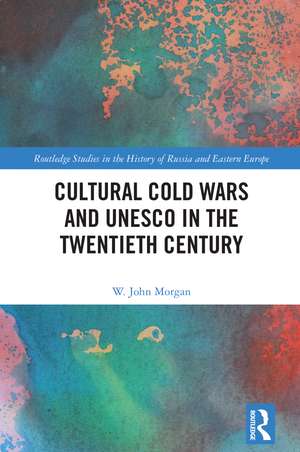Cultural Cold Wars and UNESCO in the Twentieth Century: Routledge Studies in the History of Russia and Eastern Europe
Autor W. John Morganen Limba Engleză Hardback – 30 sep 2024
The book charts the development of the concept in the twentieth century. Structured in two parts, Part I considers the League of Nations’ idealist attempts at international intellectual cooperation. It discusses also the first cultural cold war with the Communist International’s attempts to advance communism. It also analyses the ideological and cultural appeal of Italian fascism, German national socialism, and Japanese nationalist militarism; and the transition from a wartime alliance to a new cold war. Part II examines the renewal of international intellectual co-operation through the United Nations Educational, Scientific, and Cultural Organization (UNESCO) in the context of a second cultural cold war between the capitalist democracies and the communist bloc. The book shows that UNESCO became a site of this ideological competition and an example of its tensions.
Based on original research and a comprehensive review of the literature, including in Russian, German, and French, the book will appeal to academics, postgraduate researchers, advanced undergraduates, and others interested in recent international history and the comparative politics of ideas.
Din seria Routledge Studies in the History of Russia and Eastern Europe
- 15%
 Preț: 403.76 lei
Preț: 403.76 lei -
 Preț: 325.11 lei
Preț: 325.11 lei - 9%
 Preț: 935.04 lei
Preț: 935.04 lei -
 Preț: 284.52 lei
Preț: 284.52 lei - 14%
 Preț: 315.08 lei
Preț: 315.08 lei - 18%
 Preț: 1057.40 lei
Preț: 1057.40 lei -
 Preț: 427.12 lei
Preț: 427.12 lei - 14%
 Preț: 325.34 lei
Preț: 325.34 lei - 18%
 Preț: 273.05 lei
Preț: 273.05 lei - 18%
 Preț: 1279.68 lei
Preț: 1279.68 lei -
 Preț: 379.70 lei
Preț: 379.70 lei -
 Preț: 383.33 lei
Preț: 383.33 lei - 12%
 Preț: 325.34 lei
Preț: 325.34 lei - 18%
 Preț: 1056.28 lei
Preț: 1056.28 lei - 16%
 Preț: 274.06 lei
Preț: 274.06 lei - 18%
 Preț: 999.97 lei
Preț: 999.97 lei - 18%
 Preț: 1276.34 lei
Preț: 1276.34 lei - 18%
 Preț: 1000.27 lei
Preț: 1000.27 lei - 18%
 Preț: 1060.87 lei
Preț: 1060.87 lei -
 Preț: 463.58 lei
Preț: 463.58 lei - 14%
 Preț: 302.36 lei
Preț: 302.36 lei -
 Preț: 444.62 lei
Preț: 444.62 lei -
 Preț: 469.34 lei
Preț: 469.34 lei - 14%
 Preț: 301.13 lei
Preț: 301.13 lei -
 Preț: 416.22 lei
Preț: 416.22 lei -
 Preț: 462.81 lei
Preț: 462.81 lei - 14%
 Preț: 312.43 lei
Preț: 312.43 lei - 18%
 Preț: 1163.63 lei
Preț: 1163.63 lei -
 Preț: 442.50 lei
Preț: 442.50 lei - 26%
 Preț: 875.55 lei
Preț: 875.55 lei - 18%
 Preț: 1116.38 lei
Preț: 1116.38 lei - 18%
 Preț: 1107.75 lei
Preț: 1107.75 lei -
 Preț: 436.14 lei
Preț: 436.14 lei - 18%
 Preț: 1273.35 lei
Preț: 1273.35 lei
Preț: 1005.17 lei
Preț vechi: 1225.81 lei
-18% Nou
Puncte Express: 1508
Preț estimativ în valută:
192.33€ • 201.36$ • 159.15£
192.33€ • 201.36$ • 159.15£
Carte tipărită la comandă
Livrare economică 07-21 aprilie
Preluare comenzi: 021 569.72.76
Specificații
ISBN-13: 9780367859930
ISBN-10: 0367859939
Pagini: 236
Dimensiuni: 156 x 234 mm
Greutate: 0.59 kg
Ediția:1
Editura: Taylor & Francis
Colecția Routledge
Seria Routledge Studies in the History of Russia and Eastern Europe
Locul publicării:Oxford, United Kingdom
ISBN-10: 0367859939
Pagini: 236
Dimensiuni: 156 x 234 mm
Greutate: 0.59 kg
Ediția:1
Editura: Taylor & Francis
Colecția Routledge
Seria Routledge Studies in the History of Russia and Eastern Europe
Locul publicării:Oxford, United Kingdom
Public țintă
PostgraduateCuprins
Introduction Part One: Cultural Cold Wars 1. Cultural and Intellectual Internationalism Between the Wars; 2. The First Cultural Cold War: International Communism; 3. The Cultural and Intellectual Appeal of Fascism; 4. From Wartime Alliance to the Second Cultural Cold War Part Two: UNESCO and the Cultural Cold War 5. UNESCO and the Politics of International Cooperation after 1945; 6. UNESCO and the Early Cultural Cold War; 7. Conclusion: UNESCO and the Politics of Ideas in the late Twentieth Century; Bibliography; Index
Notă biografică
W. John Morgan is Professor Emeritus at the School of Education, University of Nottingham, where he was UNESCO Chair of the Political Economy of Education. He is also an Honorary Professor at the University of Jordan and until recently was Honorary Professor and Leverhulme Emeritus Fellow, Wales Institute of Social and Economic Research and Data, Cardiff University, Wales, United Kingdom. A Fellow of the Royal Society of Arts, of the Learned Society of Wales, and of the Royal Historical Society, he has also been a Commonwealth Scholarship Commissioner for the United Kingdom and Chairman of the United Kingdom National Commission for UNESCO. His previously published works with Routledge include Civil Society, Social Change, and a New Popular Education in Russia (with I.N. Trofimova and G.A. Kliucharev), Philosophy, Dialogue, and Education: Nine modern European philosophers (with A. Guilherme), Buber and Education: Dialogue as conflict resolution (with A. Guilherme), Chinese Higher Education Reform and Social Justice (edited, with B. Wu), and Higher Education Reform in China: Beyond the expansion (edited, with B. Wu).
Descriere
This book addresses the now considerable interest in the concept of cultural cold war as a means of advancing ideologies. It will appeal to academics, postgraduate researchers, advanced undergraduates, and others interested in recent international history and the comparative politics of ideas.
